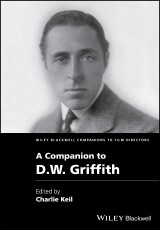Details

A Companion to D. W. Griffith
Wiley Blackwell Companions to Film Directors 1. Aufl.
|
177,99 € |
|
| Verlag: | Wiley-Blackwell |
| Format: | |
| Veröffentl.: | 05.12.2017 |
| ISBN/EAN: | 9781118341216 |
| Sprache: | englisch |
| Anzahl Seiten: | 624 |
DRM-geschütztes eBook, Sie benötigen z.B. Adobe Digital Editions und eine Adobe ID zum Lesen.
Beschreibungen
<p><b>The most comprehensive volume on one of the most controversial directors in American film history</b> </p> <p><i>A Companion to D.W. Griffith</i> offers an exhaustive look at the first acknowledged auteur of the cinema and provides an authoritative account of the director’s life, work, and lasting filmic legacy.</p> <p>The text explores how Griffith’s style and status advanced along with cinema’s own development during the years when narrative became the dominant mode, when the short gave way to the feature, and when film became the pre-eminent form of mass entertainment. Griffith was at the centre of each of these changes: though a contested figure, he remains vital to any understanding of how cinema moved from nickelodeon fixture to a national pastime, playing a significant role in the cultural ethos of America.</p> <p>With the renewed interest in Griffith’s contributions to the film industry, <i>A Companion to D.W. Griffith</i> offers a scholarly look at a career that spanned more than 25 years. The editor, a leading scholar on D.W. Griffith, and the expert contributors collectively offer a unique account of one of the monumental figures in film studies.</p> <ul> <li>Presents the most authoritative, complete account of the director’s life, work, and lasting legacy</li> <li>Builds on the recent resurgence in the director’s scholarly and popular reputation</li> <li>Edited by a leading authority on D.W. Griffith, who has published extensively on this controversial director </li> <li>Offers the most up-to-date, singularly comprehensive volume on one of the monumental figures in film studies</li> </ul>
<p>Contributors viii</p> <p>Preface ix<br /><i>Paolo Cherchi Usai</i></p> <p>Introduction 1</p> <p><i>Charlie Keil</i></p> <p><b>Part One Griffith Redux</b></p> <p>1 Disciplinary Descent: Film Studies, Families, and the Origins of Narrative Cinema 17<br /><i>Jennifer M. Bean</i></p> <p>2 Griffith’s Moral Profile 34<br /><i>Ben Singer</i></p> <p>3 “The Beauty of Moving Wind in the Trees”: Cinematic Presence and the Films of D.W. Griffith 74<br /><i>Daniel Fairfax</i></p> <p><b>Part Two Style in the Biograph Era</b></p> <p>4 D.W. Griffith and the Emergence of Crosscutting 107<br /><i>André Gaudreault and Philippe Gauthier</i></p> <p>5 D.W. Griffith and the Primal Scene 137<br /><i>Tom Gunning</i></p> <p>6 Griffith’s Biograph Shorts: Electric Power and Film Style, from East to West 150<br /><i>Charles O’Brien</i></p> <p><b>Part Three Imagery and Intermediality</b></p> <p>7 Deep Theatrical Roots: Griffith and the Theater 175<br /><i>David Mayer</i></p> <p>8 Notes on Floral Symbolism, Allegory, and Intermediality in the Films of D.W. Griffith 191<br /><i>Jan Olsson</i></p> <p>9 Living Portraits: Signs of (the) Time in D.W. Griffith 216<br /><i>Joyce E. Jesionowski</i></p> <p><b>Part Four Gender and Progressivism</b></p> <p>10 Griffith’s Body Language and Film Narration: “The Voluptuary” Versus “the Spirituelle” 245<br /><i>Maggie Hennefeld</i></p> <p>11 Cross?]Dressing in Griffith’s Biograph Films: Humor, Heroics, and Edna “Billy” Foster’s Good Bad Boys 284<br /><i>Laura Horak</i></p> <p>12 Space, Gender, Oversight, and Social Change: Progressivism and the Films of D.W. Griffith, 1909–1916 309<br /><i>Moya Luckett</i></p> <p>13 Progressive Pastoral: Social Justice Reforms and Biograph Films, 1908–1911 330<br /><i>Grant Wiedenfeld</i></p> <p><b>Part Five Revisiting Failed Features</b></p> <p>14 Gendering Ministry and Reform: Griffith and the Plight of Protestant Uplift 361<br /><i>Anne Morey</i></p> <p>15 “Squalid Without Being Tragic”: Griffith’s “Isn’t Life Wonderful” 385<br /><i>Russell Merritt</i></p> <p>16 Faust at Famous Players 423<br /><i>Andrew Nelson</i></p> <p>17 Griffith in a Minor Key: Early Art Cinema Looking Backward 440<br /><i>Kaveh Askari</i></p> <p><b>Part Six Reception at Home and Abroad</b></p> <p>18 “Damage Unwittingly Done”: D.W. Griffith and the Re?]Birth of the Ku Klux Klan 463<br /><i>Tom Rice</i></p> <p>19 “History by Lightning”: D.W. Griffith in South Africa 486<br /><i>Nicole Devarenne</i></p> <p>20 Blossoms Breaking at the Dawn of Cinephilia: The Reception of D.W. Griffith in France 510<br /><i>Annie Fee</i></p> <p>21 The legacy of Intolerance 533<br /><i>Paul McEwan</i></p> <p>Index</p>
<p><strong>Charlie Keil</strong> is the Principal of Innis College, and is also a Professor at the Cinema Studies Institute and History Department at the University of Toronto. He has published six books, many focusing on aspects of silent cinema. He is an editorial board member of <em>Cinema Journal, Canadian Journal of Film Studies, and Film Quarterly.</em>
<p>Once regarded as irrelevant by the Hollywood he helped to establish, D.W. Griffith is now considered one of the most important directors in film history. Griffith was instrumental in the emergence of cinema's transitional period of the early 20th Century, when the nickelodeon-era short gave way to the multi-reel feature, and when motion pictures became both a national pastime and a form of artistic expression. His crucial role in the development of filmic style and narrative conventions made him one of the first auteurs of the American cinema and a key figure in its aesthetic history. <p> <em>A Companion to D.W. Griffith</em> offers a collection of 21 original essays that analyze Griffith's work from a variety of perspectives, collectively providing an exhaustive examination of the filmmaker's life, work, and lasting filmic legacy. Leading scholars from North America and Europe investigate Griffith's use of allegory and symbolism, his role in establishing popular editing techniques such as crosscutting and scene analysis, and his attention to aspects of mise-en-scène, from performance to lighting. Contributors also study the role of gender and race in both Griffith's Biograph films and his features, and discuss his relationship to the Progressive movement. Others extend our knowledge of the reception and critical reputation of rarely considered mid-period features, in addition to key masterworks such as <em>The Birth of a Nation</em> (1915), <em>Intolerance</em> (1916), and <em>Broken Blossoms</em> (1919). <p>With the recent revival of scholarly interest in Griffith's career and contributions to cinema, <em>A Companion to D.W. Griffith</em> is a timely and comprehensive exploration of this influential yet controversial pioneering figure, and a valuable resource for students of film history, silent cinema, and film directing.

















